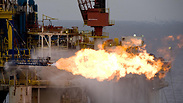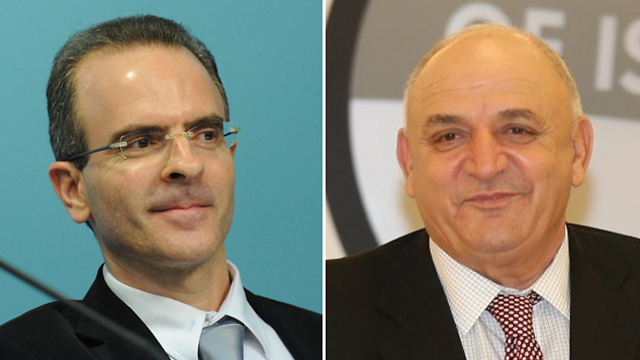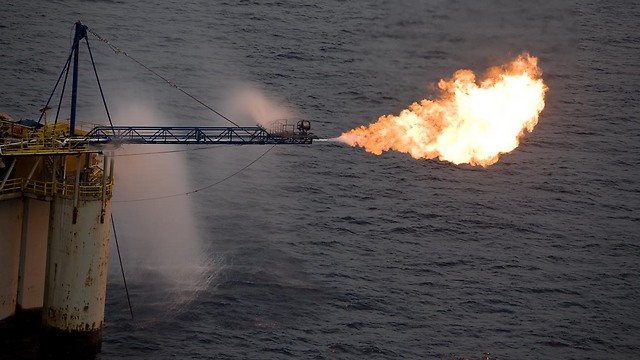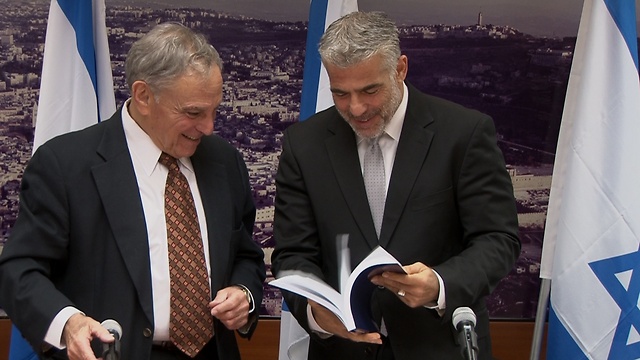
Netanyahu calls for 'review' of gas monopoly decision
After anti-trust authority decides to break up monopoly on Israel's natural gas fields, Netanyahu moves to restructure as Nobel Energy calls move 'another disturbing example of the uncertain regulatory environment in Israel.'
Prime Minister Benjamin Netanyahu has ordered a "review" of a highly controversial call by Israel's Anti-trust Authority to break up the monopoly control of the country's offshore gas reserves by Noble Energy and Delek Group, who together hold 85 percent of the giant Leviathan field.
In wake of the decision, Netanyahu ordered the head of the National Economic Council, Professor Eugene Kendall, to carry out a possible restructuring following the decision by Prof. David Gila, the commissioner of Israel's Anti-trust Authority, to break up the partnership developing the Leviathan gas field.

"The prime minister is not in any way interfering with the antitrust authority's decision, and has no power to do so," said the statement. "He only told the National Economic Council to review the decision's significance."
Meanwhile , Nobel Energy slammed the move and called for a hearing with the authority in the coming weeks, saying that the decision stands in contradiction to a March 2014 agreement between Noble Energy, its partners, and the Anti-trust Authority which they claimed was a key component in their final investment decision on the Leviathan development.
"The actions of the Anti-trust Authority are another disturbing example of the uncertain regulatory environment in Israel," Charles D. Davidson, Noble chairman, said, adding that "this is a matter that we believed was resolved some time ago and … this is a harmful precedent for Israel to set."
David Stover, Nobel's president and CEO, added, that Nobel was "disappointed" by the move,
Leviathan is one of the world's largest offshore gas finds to be made in the last decade, with an estimated 22 trillion cubic feet (622 billion cubic metres) of reserves. Production had been expected to begin in 2018 following an initial investment in the development of around $6.5 billion.
Prof. Gila announced Wednesday morning that he was withdrawing from the agreement formulated last March, and he has decided to revoke the compromise deal that would have allowed Texas-based Noble Energy and Israel's Delek Group to keep control of Leviathan.
The move meant Prof. Gila would recommend the courts break up the partnership, which would entail either forcing separate sales so each partner would be responsible for its own sector of the reservoir, or causing some of partners – mainly Delek and Noble Energy – to sell their share to a third party and create a new player in the market, one that could compete for contracts and serve as a counterweight against the current monopoly at the Tamar gas field.
Meanwhile, Prof. Eytan Sheshinski, who headed the Netanyahu-backed committee for fiscal policy for oil and gas resources in Israel, expressed support Wednesday for Gila's decision. "I think the decision is appropriate," he said. "The chance of creating real competition from the previous arrangement he proposed – selling the smaller fields, Tanin and Karish, is small."
"But I have two remarks. The first is that the creation of a duopoly will not lead to an increase in competition. Everyone knows the problem with a monopoly. But the question we must ask ourselves is, if the previous arrangement didn't work, then what's on the table?
"One option is, as reported today, reaching a decision to force these companies to sell one of the two large gas fields – Leviathan and Tamar. The result would be a duopoly. Not a duopoly like Poalim-Leumi (two major Israeli banks), where there are small and mid-size competitors, but a duopoly in every way. There would be no mid-size and small competitors.
"Economic theory and attempts at a balanced duopoly do not justify this optimism. Whoever thinks creating two companies in the gas market will create competition needs to reconsider. The economists certainly won't accept the idea that a duopoly will bring competitive prices. "
Binyamin Zommer, Noble's manager in Israel, said the authority's decision "will cast a shadow over the future of the oil and gas industry in Israel and will impact Noble Energy's continued investment there."
Zommer said Noble, which along with its partners has invested $6 billion in Israel's oil and gas sector, remained committed to developing Leviathan, as soon as regulatory, commercial and financial conditions allow.
He also said Noble bought the Leviathan license with Israeli government approval.
Yitzhak Tshuva, Delek's controlling shareholder, said he had risked a large amount of money to develop the oil and gas business and that a forced sale of Leviathan might harm agreements Israel has made with other countries.
Leviathan partners are in talks with Britain's BG Group , which wants to run a subsea pipeline from Leviathan to its 10 bcm a year liquefied natural gas export plant on Egypt's Mediterranean coast, and with Jordan's national electricity company.
Only the Palestinian Authority has so far committed to buying gas, agreeing a 20-year deal worth $1.2 billion.
Reuters contributed to this report












